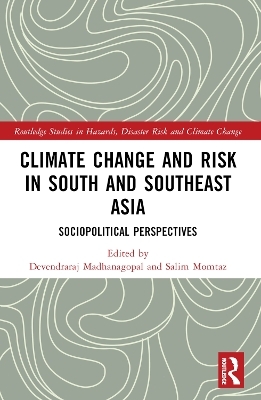
Climate Change and Risk in South and Southeast Asia
Routledge (Verlag)
978-1-032-10673-1 (ISBN)
This book, focuses on South and Southeast Asia, upgrades our understanding of the influence of multiple sociopolitical and governance factors on climate change and risks. Moving beyond science and technology-oriented discussions on climate change, it argues that the real solutions to climate change problems lie in societies, governance systems, non-state actors, and the power and politics underpinning these systems.
It presents a range of detailed conceptual, empirical, and policy-oriented insights from different nations of South and Southeast Asia, including India, Bangladesh, Sri Lanka, Indonesia, Vietnam, Maldives, and Bhutan. The chapters bring forth critical discussions of climate change, covering a diverse range of topics including livelihoods, gender, community perspectives, relocation, resilience, local politics, climate change communication, governance, and policy responses. By investigating climate change vulnerabilities and as well as offering feasible solutions to the states and other non-state actors in responding to climate change and risks, this book deepens our existing knowledge of the social and political dimensions of climate change.
With interdisciplinary perspectives, this book will appeal to all students, researchers, and scholars of environmental studies, geography, disaster studies, sociology, policy studies, development studies, and political science. It provides valuable reading to practitioners, policymakers, and professionals working in related fields.
Devendraraj Madhanagopal (Ph.D.) is an Assistant Professor (II) in the School of Sustainability at XIM University (Odisha, India). He holds a Ph.D. in Sociology from the Department of Humanities and Social Sciences, Indian Institute of Technology Bombay (Mumbai, India). He is the recipient of several international travel grants and fellowships. His works appear in Environment, Development and Sustainability and Metropolitics journals. He is the corresponding editor of the following edited books: Environmental, Climate, and Social Justice: Perspectives and Practices from the Global South (2022) and Social Work and Climate Justice: International Perspectives (forthcoming, Routledge). Salim Momtaz (Ph.D.) is an Affiliate Associate Professor at the University of Newcastle, Australia. He teaches in the area of Sustainable Resource Management. He received his BSc and MSc degrees in Geography from University of Dhaka, Bangladesh. He did a Ph.D. in Development Studies from the University of London under a Commonwealth Scholarship. His academic careers spans over 35 years. He published 13 books, 8 book chapters, and many articles in international journals. He was a member of the Scientific Advisory Committee, Netherlands Government Research Organization, between 2007 and 2010; currently, he is serving the European Climate, Infrastructure and Environment Executive Agency (CINEA) as an Expert Evaluator.
The social and political dimensions of climate change: Focus on South and Southeast Asia
Part I: The multiple challenges of climate change and risks
"Those who makes an enemy of the earth makes an enemy of themselves": Climate Change and Human Activities from a South and Southeast Asian Perspective
Post-cyclone Livelihood Strategies and Security Status of Coastal Households in Bangladesh: An Empirical Study
Community Perceptions of Climate Change Governance Practices: A Case Study of Hatiya Subdistrict, Bangladesh
Gender, Climate Justice, and (Un)Sustainable Development in Indonesia
Part II: Responding to climate change: Sociopolitical underpinnings of multiple actors and institutions
The resilience of Fisheries Households to Climate Shock in Tam Giang – Cau Hai lagoon, Vietnam
Relocation as a climate change risk-reduction strategy: Socio-political insights from Sri Lanka
Does local politics have relevance to the local climate action programs in India and Bangladesh? Review and Discussion
Communication tools to tackle cascading effects of climate change: Evidence from Eastern Bihar, India
Climate Change Communication in Kolkata: Applying Communication Theories to Address Climate Change Displacement
Part III: Power and Politics of climate change: Focusing on strategies and policies
Climate Change and the Government Conundrum in Bhutan
Localized policy responses for climate change and developmental complications: Discussions from three coastal regions of India
A "Coral State." Socio-political implications of the reefs’ crises in the Maldives
Polycentricity is a framework for understanding India’s climate policy
| Erscheinungsdatum | 18.04.2024 |
|---|---|
| Reihe/Serie | Routledge Studies in Hazards, Disaster Risk and Climate Change |
| Zusatzinfo | 19 Tables, black and white; 21 Line drawings, black and white; 5 Halftones, black and white; 26 Illustrations, black and white |
| Verlagsort | London |
| Sprache | englisch |
| Maße | 156 x 234 mm |
| Gewicht | 453 g |
| Themenwelt | Naturwissenschaften ► Biologie ► Ökologie / Naturschutz |
| Naturwissenschaften ► Geowissenschaften ► Geografie / Kartografie | |
| ISBN-10 | 1-032-10673-5 / 1032106735 |
| ISBN-13 | 978-1-032-10673-1 / 9781032106731 |
| Zustand | Neuware |
| Haben Sie eine Frage zum Produkt? |
aus dem Bereich


